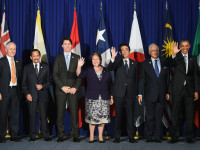Last month, the University of Ottawa hosted a standing room only panel on technology and the TPP featuring Burcu Kilic, Carolina Rossini, Jeremy deBeer, Tamir Israel and myself. The panel was moderated by Loris Mirella, the lead IP negotiator on the TPP for the Canadian government. A full video of the event is posted below.

Cooperation in the Pacific Rim by Jakob Polacsek, World Economic Forum (CC BY-NC-SA 2.0) https://www.flickr.com/photos/worldeconomicforum/48179628441
Digital Trade
What Canadian Heritage Officials Didn’t Tell Minister Mélanie Joly About Copyright
Last week, Canadian Heritage posted the Ministerial briefing book that officials used to bring new minister Mélanie Joly up-to-speed on the issues in her portfolio. The proactive release is a great step toward further transparency. While the mandate letter from the Prime Minister provides insight into government policy priorities, the briefing book sheds light on what department officials view as priorities and how they frame key issues.
The copyright presentation is particularly revealing since it presents Minister Joly with a version of Canadian copyright lacking in balance in which “exceptions are always subject to certain conditions” but references to similar limitations on rights themselves are hard to find. Department officials present a frightening vision of emerging copyright issues, pointing to mandated Internet provider blocking, targeting copyright infringement that occurs on virtual private networks, and “hybrid” legal/illegal services that may be a reference to Canadians accessing U.S. Netflix. The suggestion that Canadian Heritage officials have identified site blocking or legal prohibitions on VPN or U.S. Netflix usage as emerging copyright issues should set off alarm bells well in advance of the 2017 copyright reform process.
Signing vs. Ratifying: Unpacking the Canadian Government Position on the TPP
The official release of the Trans Pacific Partnership (TPP), a global trade agreement between 12 countries including Canada, the United States, and Japan, has generated considerable confusion over where the Trudeau government stands on the deal. The TPP was concluded several weeks before the October election and the Liberals were careful to express general support for free trade, but refrain from embracing an agreement that was still secret.
Over the past month, there have been mixed signals over the issue. Chrystia Freeland, the new Minister of International Trade, has committed to a public consultation and noted that her government is not bound by commitments made by the Conservatives (in the interests of full disclosure, I had the opportunity to meet with Minister Freeland to discuss the TPP earlier this month). Yet following a meeting between Prime Minister Justin Trudeau and U.S. President Barack Obama at the APEC conference in Manila, Obama indicated that he expects Canada to soon be a signatory to the deal.
How to explain the seemingly inconsistent comments on the Canadian position on the TPP? The answer may well lie in the differences between reaching an agreement-in-principle, signing the formal text, and ratifying the deal. Each step is distinct and carries different legal obligations.
Why the TPP is a Canadian Digital Policy Failure
The official release of the Trans Pacific Partnership (TPP), a global trade agreement between 12 countries including Canada, the United States, and Japan, has sparked a heated public debate over the merits of the deal. Leading the opposition is Research in Motion founder Jim Balsillie, who has described the TPP as one of Canada’s worst-ever policy moves that could cost the country billions of dollars.
My weekly technology law column (Toronto Star version, homepage version) notes that as Canadians assess the 6,000 page agreement, the implications for digital policies such as copyright and privacy should command considerable attention. On those fronts, the agreement appears to be a major failure. Canadian negotiators adopted a defensive strategy by seeking to maintain existing national laws and doing little to extend Canadian policies to other countries. The result is a deal that the U.S. has rightly promoted as “Made in America.” [a video of my recent talk on this issue can be found here].
Canada and the TPP: My Talk on a Digital Policy Failure
Last week, I had the opportunity to deliver the keynote address at a Centre for International Governance Innovation (CIGI) panel on the TPP. My talk, which begins at 4:25 and runs until 41:00, focused on the digital policies within the massive agreement, including intellectual property, privacy, and Internet governance. After the talk, there was a panel discussion featuring Myra Tawfik, Warren Clarke, Barry Sookman, and David Lametti. The full event can be found here and is embedded below.











